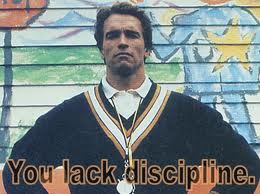Steps for Writing Success
As writers, I think it’s extremely important that we’re able to balance everything we have on our plates. From queries for unpolished short stories to book trailers for novels-in-progress to workshops to contests—so on and so forth—it’s important to be able to step back from the chaos and say, “Okay, what do I tackle first?”
The following are steps I take to ensure the maximum quality of my stories. To eliminate a majority of the paths laid out before me. To make it easier to get where I want to be.
Stay organized
Neat and clean home. Healthy mind and body. Organized folders with clear titles. These types of systems promote happiness. You know how the rest goes.
 As a writer, I’ve found keeping files in order, maintaining clutter and labeling things properly can go a long way. But being organized doesn’t just stop there. I’m also referring to the structure in which we do things. Outlines, ideas, even notes to ourselves. What good are these things if we have to spend hours locating and deciphering them?
As a writer, I’ve found keeping files in order, maintaining clutter and labeling things properly can go a long way. But being organized doesn’t just stop there. I’m also referring to the structure in which we do things. Outlines, ideas, even notes to ourselves. What good are these things if we have to spend hours locating and deciphering them?
The idea is to make the journey ahead flow as smoothly as possible, and with having structure and staying organized, not only will we save precious time, but we’ll also feel better about ourselves. Sort of like coming home and relaxing in a living room filled with mounds of trash and road kill and lice—it’s not very enjoyable.
Focus your efforts
I’m always catching myself hopping from one unfinished story to the next. What can I say? When I’m a few thousand words in, either a new idea pops up out of nowhere, or I lose steam and the story no longer holds my interest. Thus I dive into a new project.
 This is when we need to step back, look at all of the projects going on and choose the one which most fits our needs. Do we want a story simply for entertaining our friends? Do we want a story to win a contest? Is our goal to get a novel published?
This is when we need to step back, look at all of the projects going on and choose the one which most fits our needs. Do we want a story simply for entertaining our friends? Do we want a story to win a contest? Is our goal to get a novel published?
My son gets very frustrated with activities he’s not able to complete on his own. Like certain video games, or pedaling up a hill, or putting together a puzzle. Once he can’t jump onto the moving glacier in Wolverine, he jumps to building Legos. Once he can’t put together the pirate ship, he jumps to something else. The point is, this process becomes routine for him. He’ll do the same things over and over, failing each time. But that’s when focus comes in. I’ll help him work through the frustration. Through the uncertainty of what to do. Through the temptation to jump to something else and complete it 50%. And you know what? He may not have wanted to do all the work necessary to land on the glacier, but at the end of the day, at least Wolverine didn’t fall into the freezing waters below and sink to the bottom where he suffered a long and grueling drowning sequence because of his enhanced abilities to breathe longer.
Tackling one problem, no matter how hard, will give us the confidence we need moving forward. That way, when we jump into the next problem, no matter how daunting it seems, we can say, “I did it before, and I’ll do it again.”
I’ve come to learn that when seeking success, we don’t really need to convince others. We need to convince ourselves, because that’s where we develop confidence, and confidence is important when we’re trying to get published.
Introduce discipline
 At one point or another, every author needs a Job Personality to intervene. A Job Personality refers to how we function at work. Obviously if the boss hands us a task, we can’t just hand it back half-done and say, “I’m going to work on something better.”
At one point or another, every author needs a Job Personality to intervene. A Job Personality refers to how we function at work. Obviously if the boss hands us a task, we can’t just hand it back half-done and say, “I’m going to work on something better.”
So for our writing careers, we need to introduce discipline to push us over the hump. You know you want to finish that short story, because you believe it’s your best idea, but it isn’t going to finish itself.
One thing I do when I get to this point is force myself to open the document and type a sentence. It’s like getting waist-deep into a cold pool. At first, you’d never do it. But once you do, it doesn’t seem all that bad. Unless you’re like my wife and constantly freezing, then you’re pretty much done hereJ But for the rest of us, we just need something to get the ball rolling.
Most of the time we’re not afraid to write—we’re afraid to make decisions. We write a flawless opening, but then we’re afraid to ruin it. Perhaps the decision we come to about Marco’s terminally ill dog will destroy our progress. Which leads us into the next step:
Don’t be afraid
Don’t be afraid to write in the dark. Don’t be afraid to make tough decisions. Don’t be afraid to edit. Don’t be afraid of this:

Don’t be afraid to put yourself out there and receive criticism. Don’t be afraid to pour yourself into your craft, because eventually, if you dedicate enough time, you will achieve your goals. Don’t be afraid to do what I’m doing and break rules. Don’t be afraid of bullies in real life. Don’t be afraid to be silly. Don’t be afraid to be dramatic. Don’t…
Acceptance is key
If you want to be a good writer, you’ll have to accept certain things. For instance:
Your debut novel isn’t going to burst onto the scene as a NYT bestseller.
Writing isn’t all fun and imaginary names. You’ll need to do work—most of the time “a lot”.
You will fail.
You will be asked to delete parts of the story you love.
You will produce bad stories no matter how hard you try not to.
You will get rejections.
You will be waiting for responses for a long time (even sloths will attest to how slow publishing is).
Certain things certain people say will come across as demoralizing. They will offend you. You will be inclined to retort. Don’t.
You will want to give up.
You will stare at yourself in the mirror, recite out loud your facial descriptions and come up with another idea for a story.
You will give up.
If you can accept these things and find the motivation to steer through them, then there’s no doubt you will progress into a better writer. Once you’re a better writer, you’ll come to learn that as bad as the above sounds, there are positive certainties:
No matter how many rejections you receive, a new story clears the slate.
Writing eventually becomes all fun and imaginary names. Especially when you’ve mastered the basics.
When you stare into the mirror, you will not recite your facial descriptions because you’ll know that’s a huge cliché.
You will set more realistic goals.
You will be writing because you love the craft.
Anyone can develop into a good writer. You don’t need athleticism or contacts or money—only the passion to prevail.
In a crowded world, writing becomes an escape where it’s just you and the characters you create. Unless you have 39 kids like the Duggars, then you’ll never be alone.
You will meet others with your addiction.
And finally, when you do succeed, it will be one of the best feelings in the world.
Confidence
As touched upon earlier, every author needs confidence. We gain this from all of the things we do. Practicing. Studying. Researching. Reading. Overcoming obstacles.
 Once we’ve gone through the basics a bunch of times (do this, don’t do that), we break off the training wheels and decide there aren’t correct universal rules. Like NBA players don’t have the same shot. Famous artists don’t have the same style. Companies don’t have the same business model. And as times change, NBA players, famous artists, successful companies, they learn to adapt.
Once we’ve gone through the basics a bunch of times (do this, don’t do that), we break off the training wheels and decide there aren’t correct universal rules. Like NBA players don’t have the same shot. Famous artists don’t have the same style. Companies don’t have the same business model. And as times change, NBA players, famous artists, successful companies, they learn to adapt.
The same holds true for our writing. Each of us will eventually need to develop a unique voice which separates us from the crowd. But yet, that voice will need to be good enough to allow us access to the crowd. What gets us there is confidence, and we gain that from the previous steps. By knowing we’ll fall. By getting up and coming back stronger. By doing what we do even though there may not be a prize at the end of the maze.
Love thy hobby
The bottom line here is, if you just want money, you’re definitely in the wrong place. Stories need love, because people need to feel emotion when they read your work. You won’t get anywhere if your work screams, “When can I cash the check?” And the only way to pull a reader into your story is to make them feel your words. Make them feel your love of writing. Of story-telling.
If you love your writing, you’ll spend more time with it, and it will become better. But unfortunately, nobody can teach you how to love. You have to find your own way.
So in closing, remember to dive in organized, stay focused, use discipline, don’t be afraid to accept the inevitable, let your passion carry you through the obstacles, and come out with a newfound confidence which will take you wherever you want to be.

Leave a Reply